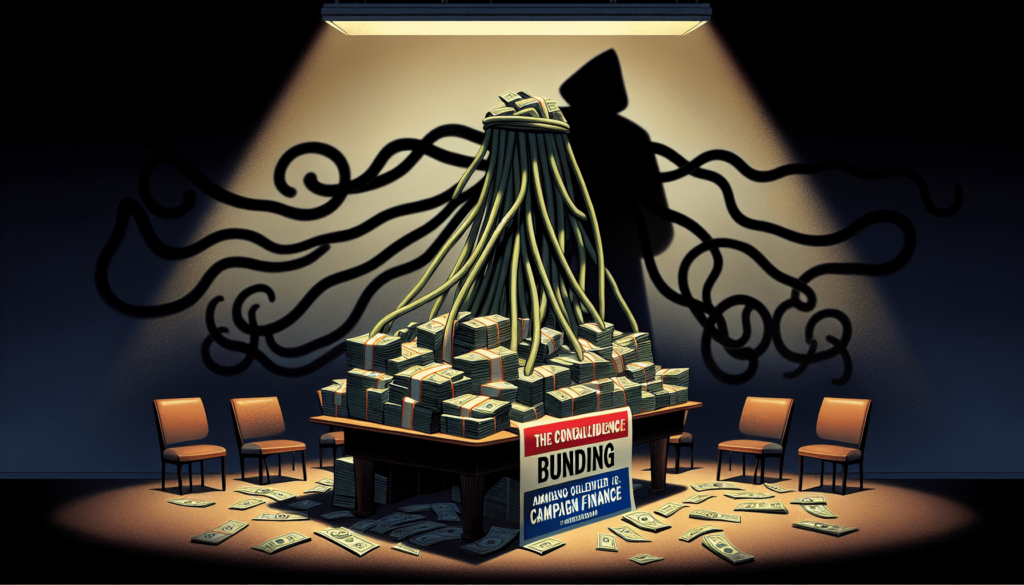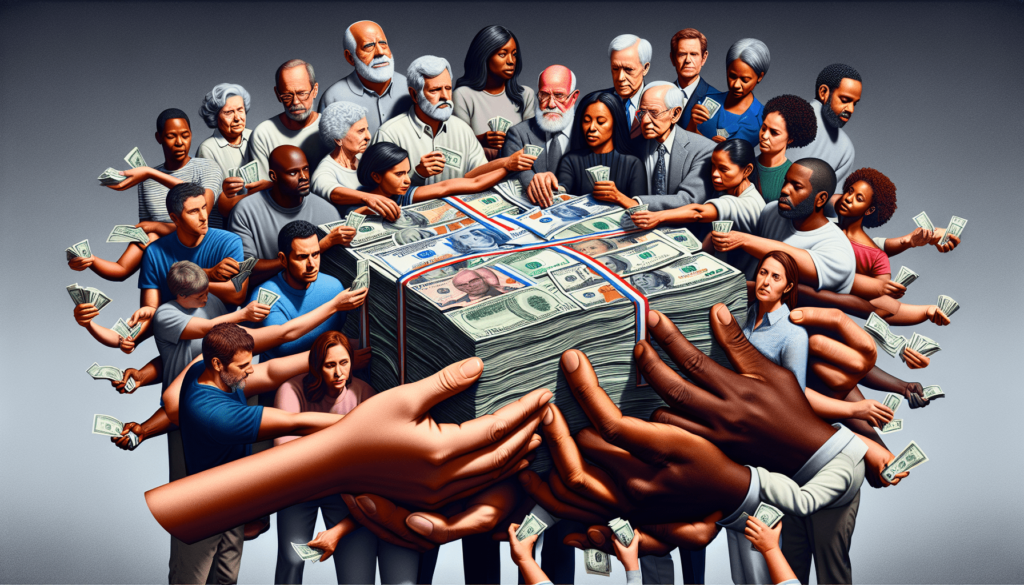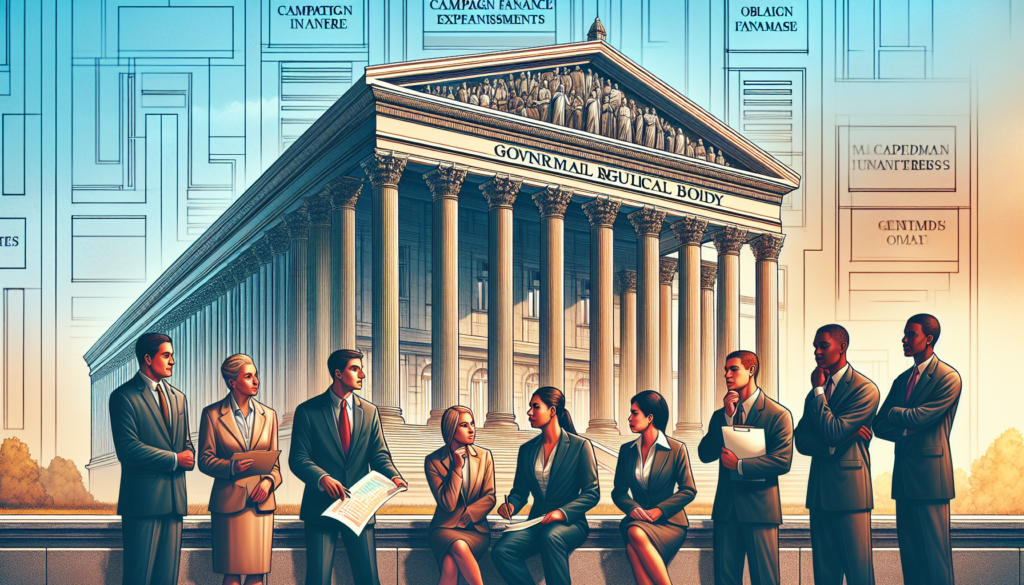Have you ever wondered what exactly is meant by the term “bundling” in the realm of campaign finance? If so, look no further! In this article, we will shed light on the concept of bundling, exploring its significance and role within the world of political fundraising. From understanding how individuals combine their contributions to exploring the potential implications and controversies surrounding this practice, we aim to provide you with a comprehensive understanding of what bundling truly entails. So, let’s embark on this journey together and unveil the secret behind bundling in campaign finance!

Definition of Bundling in Campaign Finance
Bundling refers to the practice of individuals, known as bundlers, collecting and aggregating campaign contributions from multiple donors to present a larger sum of money to a political candidate or campaign. This process allows individual donors to combine their financial resources to have a greater impact on the fundraising efforts of a candidate. Bundlers play a crucial role in political fundraising, as they can significantly boost a candidate’s financial resources and facilitate connections between donors and candidates.
Understanding the Concept of Bundling
Bundling, in the context of campaign finance, is a mechanism that allows individual donors to pool together their contributions into a single larger sum. Instead of making donations directly to a candidate, these donors give their funds to a designated bundler, who then presents the combined amount to the candidate or campaign. This practice is legal in many countries, including the United States, and is considered an effective way to amplify the influence of individual donors.
Common Practice in Political Fundraising
Bundling has become a common practice in political fundraising, especially in countries with well-established campaign finance systems. Political candidates often rely on bundlers to gather funds from multiple sources, ranging from individual donors to political action committees (PACs) and corporations. These bundlers serve as intermediaries between the donors and the candidates, connecting individuals interested in contributing to a campaign with the appropriate channels to do so.
Bundling Regulations and Laws
Legal Framework for Bundling
Bundling in campaign finance is subject to various regulations and laws that aim to control the process and ensure transparency. Governments have implemented legal frameworks to monitor and oversee the activities of bundlers, in an effort to prevent potential corruption and maintain fair elections. These frameworks differ from country to country, but they generally focus on disclosure requirements, contribution limits, and reporting obligations.
Federal Election Campaign Act (FECA)
In the United States, the Federal Election Campaign Act (FECA) is one of the key legislative acts that governs campaign finance, including the practice of bundling. The FECA lays out rules regarding contribution limits, disclosure requirements, and reporting obligations for candidates, campaigns, and bundlers. It establishes a framework that aims to ensure transparency and prevent undue influence in the political fundraising process.
Bipartisan Campaign Reform Act (BCRA)
The Bipartisan Campaign Reform Act (BCRA) is another significant piece of legislation in the United States that has had an impact on bundling regulations. Also known as the McCain-Feingold Act, it was enacted in 2002 to reform campaign finance laws and address concerns regarding the influence of money in politics. The BCRA introduced restrictions on certain types of contributions and sought to increase transparency in the fundraising process, affecting the way bundling is conducted.
Key Regulatory Provisions
Within the legal frameworks governing bundling, there are several key regulatory provisions that establish guidelines for the practice. These provisions often include contribution limits, which set a maximum amount that an individual donor can contribute to a campaign or candidate. They also outline disclosure requirements, ensuring that the bundler provides information about the donors and the amounts bundled. Additionally, regulatory provisions may require tracking and reporting of bundled contributions, providing visibility into the source and impact of these funds.
Disclosure Requirements
One of the most important aspects of bundling regulation is the disclosure requirement. Bundlers are generally required to disclose the names and information of the individuals or entities from whom the contributions were received. Additionally, they must report the total amounts bundled and provide these details to the appropriate authorities. Disclosure requirements are essential for promoting transparency in campaign finance and allowing the public to understand the sources of funds supporting political candidates.

Bundlers’ Role and Responsibilities
What are Bundlers?
Bundlers are individuals who take on the responsibility of collecting and aggregating campaign contributions from various donors. They serve as middlemen between the donors and the candidates, orchestrating the process of bundling and presenting the combined amount to the candidates or campaigns. Bundlers can range from dedicated volunteers to influential figures in the political landscape, using their connections and networks to mobilize donors and maximize the impact of their contributions.
Building Relationships with Candidates
One of the key roles of bundlers is to build strong relationships with candidates or campaigns they support. By establishing connections and fostering trust, bundlers can effectively advocate for their chosen candidates and encourage donors to contribute. Maintaining open lines of communication and understanding the goals and values of the candidates enables bundlers to represent their interests and build a network of supporters.
Organizing and Mobilizing Donors
Bundlers play a vital role in organizing and mobilizing donors. They engage with individuals who are interested in donating to a campaign and coordinate their contributions. Bundlers often hold fundraising events, reach out to potential donors, and provide information about the candidates and their campaign platforms. This active involvement not only generates financial support but also encourages broader engagement and enthusiasm among donors.
Fundraising Events and Initiatives
Bundlers frequently organize fundraising events and initiatives to attract donors and raise funds for a candidate. These events can range from small, intimate gatherings to large-scale galas or rallies. By creating opportunities for donors to connect with candidates and engage in discussions, bundlers contribute to the overall fundraising efforts and help amplify the influence of individual donors.
Maintaining Compliance
Bundlers bear the responsibility of ensuring that their activities comply with the regulatory provisions governing campaign finance. They must accurately track and report the contributions they aggregate, keeping detailed records of the sources and amount of funds bundled. Furthermore, bundlers need to stay updated on any changes in campaign finance laws and adjust their practices accordingly to maintain compliance and transparency.
Benefits of Bundling
Amplifying the Influence of Individual Donors
One of the primary benefits of bundling is its ability to amplify the influence of individual donors. By pooling together contributions, bundlers create a larger sum of money that can have a more significant impact on a campaign. This allows individual donors, who may not be able to contribute substantial amounts individually, to play a crucial role in supporting candidates and advocating for their preferred policies and values.
Enhancing Candidates’ Financial Resources
Bundling plays a crucial role in enhancing the financial resources of political candidates. In many cases, campaigns rely on a variety of fundraising methods, and bundling is one of the most effective ways to gather substantial funds. By agglomerating contributions, bundlers provide candidates with a larger pool of resources to allocate toward advertising, campaign infrastructure, and other essential expenses. This financial support can be instrumental in enhancing a candidate’s chances of success.
Facilitating Connections between Donors and Candidates
Bundlers have the unique ability to facilitate connections between donors and candidates. Through their network of supporters, bundlers can introduce potential donors to candidates and foster relationships between them. This connection not only encourages continued support but also allows donors to engage directly with candidates, providing an opportunity for dialogue, feedback, and a sense of ownership in the political process.
Collective Impact on Campaigns
By mobilizing various donors, bundlers contribute to the collective impact on political campaigns. Their role in consolidating contributions helps create a sense of unity and purpose among supporters. Bundling can rally donors around a particular candidate or cause, generating momentum and a shared sense of purpose. This collective impact strengthens campaigns, creating a broader support base and fostering a sense of community and shared values among donors.
Criticism and Concerns with Bundling
Potential for Corruption and Favoritism
One of the main concerns surrounding bundling is the potential for corruption and favoritism. Critics argue that the practice can create an avenue for wealthy individuals or special interest groups to exert undue influence over politicians by bundling significant contributions. Unregulated or improperly monitored bundling can potentially lead to policy decisions made in favor of the bundler’s interests rather than the public’s interests, compromising the integrity of the democratic process.
Influence of Wealthy Donors
Bundling, particularly when wealthy donors are involved, raises concerns about the disproportionate influence of money in politics. Critics argue that bundling allows wealthy individuals or corporations to amplify their political influence, potentially having a greater say in policy decisions compared to ordinary citizens. This concentration of power in the hands of a few can undermine the principle of equality in the democratic process and create an uneven playing field.
Unfair Advantage for Candidates
While bundling can provide financial support to political candidates, it also raises concerns about potential unfair advantages. Candidates who have well-connected bundlers may have access to larger pools of funds, giving them a competitive edge over candidates who do not benefit from bundling. This advantage can perpetuate disparities in resources and influence in political campaigns, potentially limiting the diversity of candidates and hindering fair competition.
Lack of Transparency
A significant criticism of bundling is the lack of transparency surrounding the process. Although regulations typically require bundlers to disclose the names of individual donors, the total amount bundled, and other relevant information, the full extent of donors’ influence may not always be apparent. Some critics argue that undisclosed bundling, sometimes referred to as “dark money,” can enable individuals or organizations to exert influence without public scrutiny, undermining transparency and accountability in campaign finance.
Recent Developments and Case Studies
Supreme Court Decisions and their Impact
The issue of bundling in campaign finance has been influenced by several significant Supreme Court decisions. Cases such as Citizens United v. Federal Election Commission and McCutcheon v. Federal Election Commission have shaped the legal landscape surrounding campaign finance, including the regulation of bundling. These decisions have sparked debates and discussions about the role of money in politics and the potential consequences of loosening regulations or allowing unlimited contributions.
Notable Examples of Bundling
Numerous notable examples of bundling in campaign finance exist. In the United States, bundling has been a prevalent practice in presidential and congressional campaigns. For example, in the 2008 presidential election, former President Barack Obama’s campaign relied heavily on bundlers, with individuals like Penny Pritzker and George Soros bundling millions of dollars in contributions. Similarly, in the 2016 presidential campaign, Hillary Clinton’s campaign enlisted a large network of bundlers to aggregate contributions from various sources.
Scandals and Investigations
There have been instances where bundling has come under scrutiny due to allegations of impropriety or illegal activities. Some scandals have involved illegal foreign contributions being funneled through bundlers, thereby circumventing campaign finance laws. Investigations into these cases highlight the need for stringent regulations and oversight to ensure the integrity of the campaign finance system and prevent potential abuses.
Alternatives and Reforms
Public Financing of Campaigns
One alternative to bundling in campaign finance is the concept of public financing of campaigns. Public financing aims to reduce the influence of private money in the electoral process by providing public funds to candidates who meet specific criteria or reach a certain threshold of public support. This approach seeks to level the playing field and reduce the reliance on bundlers and private donors.
Campaign Finance Reform Proposals
Campaign finance reform proposals often address the issue of bundling. These proposals aim to limit the influence of money in politics and increase transparency in campaign finance. They may include measures such as stricter disclosure requirements, contribution limits, and publicly funded campaigns. Campaign finance reform advocates argue that these measures can help mitigate the potential negative impacts of bundling and promote fairer and more accessible elections.
Limiting the Role of Bundlers
Another potential reform is to limit the role of bundlers in the campaign finance process. This could involve imposing stricter regulations on bundlers, such as tighter reporting requirements, increased oversight, and lower contribution limits. By reducing the influence and power of bundlers, this approach aims to foster a more balanced and transparent campaign finance system.
Bundling in International Campaign Finance
Adoption of Bundling Practices Globally
While bundling originated in the United States, the practice has been adopted in various countries around the world. Campaign finance systems globally have recognized the potential benefits and pitfalls of bundling and have sought to establish regulations and guidelines accordingly. Countries such as Canada, Australia, and the United Kingdom have implemented their own frameworks governing the practice of bundling, reflecting their unique political landscapes and priorities.
Regulatory Approaches in Different Countries
Different countries have taken diverse approaches to regulate bundling in campaign finance. For example, Canada requires bundlers to disclose their activities and the contributions they collect, although with certain exemptions based on the amount or frequency of the bundled contributions. The United Kingdom, on the other hand, imposes limits on the amount of money an individual can contribute to a political party, thereby indirectly regulating the impact of bundling. These varying regulatory approaches highlight the importance of understanding local contexts and tailoring regulations appropriately.
Disclosure and Transparency
Importance of Transparent Reporting
Transparency in reporting bundled contributions is crucial for maintaining the integrity of the campaign finance system. Transparent reporting enables the public, media, and regulatory bodies to monitor the flow of funds and identify potential instances of corruption or undue influence. It also allows donors to understand who their contributions are benefiting and make informed decisions based on the candidates or causes they support.
Challenges in Tracking Bundled Contributions
Tracking bundled contributions can be challenging due to the complexity and fluidity of the process. Bundling often involves multiple layers of intermediaries, making it difficult to trace the origin and impact of each contribution. Additionally, the aggregation of funds can make it challenging to discern the true identities of the individual donors and the motivations behind their contributions. These challenges underscore the need for comprehensive regulations and adequate oversight to ensure transparency in campaign finance.
Improving Disclosure Requirements
To address the challenges in tracking bundled contributions, there is a need to continually improve disclosure requirements. Regulations should demand more detailed and accurate reporting, including information about the bundler, the individual donors, the amounts bundled, and any potential conflicts of interest. Strengthening disclosure requirements helps shed light on the bundling process and provides greater transparency to the public, reinforcing accountability and trust in the political system.
Technology’s Role in Enhancing Transparency
Technology plays a vital role in enhancing transparency in campaign finance, including the practice of bundling. Digital platforms and software can streamline the reporting and disclosure process, making it easier for bundlers to comply with regulations and for regulatory bodies to monitor the bundled contributions. Advancements in data analytics and digital tracking systems can also help identify patterns and detect any potential misconduct or non-compliance. Embracing technology can significantly enhance transparency and accountability in campaign finance and reduce the likelihood of fraudulent or improper practices.
Conclusion
The practice of bundling in campaign finance has significant implications for democracy and the electoral process. Bundlers play a crucial role in fundraising, amplifying the influence of individual donors, and fostering connections between donors and candidates. However, concerns about corruption, the influence of wealthy donors, and lack of transparency have led to debates and calls for reform. Various legal frameworks and regulatory approaches have been implemented to address these concerns, but the effectiveness of these measures varies.
Recent Supreme Court decisions, notable case studies, and scandals have shed light on the complexities and potential pitfalls of bundling. Alternatives and reforms, such as public financing of campaigns and campaign finance reform proposals, offer potential solutions to mitigate the negative effects of bundling. International experiences and regulatory approaches also highlight the diverse ways bundling is addressed in different countries.
Transparency, disclosure, and technological advancements play key roles in enhancing the accountability and integrity of the campaign finance system, including the practice of bundling. Improving reporting requirements and leveraging digital tools can enhance transparency, track bundled contributions, and prevent potential abuses.
While the concept of bundling in campaign finance is not without its critics and concerns, it remains an integral part of the political fundraising landscape. Ongoing discussions and debates, as well as the role of media and public awareness, are essential in shaping the future of bundling and ensuring its alignment with democratic principles and values.
The article What Is Bundling In Campaign Finance? first appeared on https://motorcitytennis.net.










